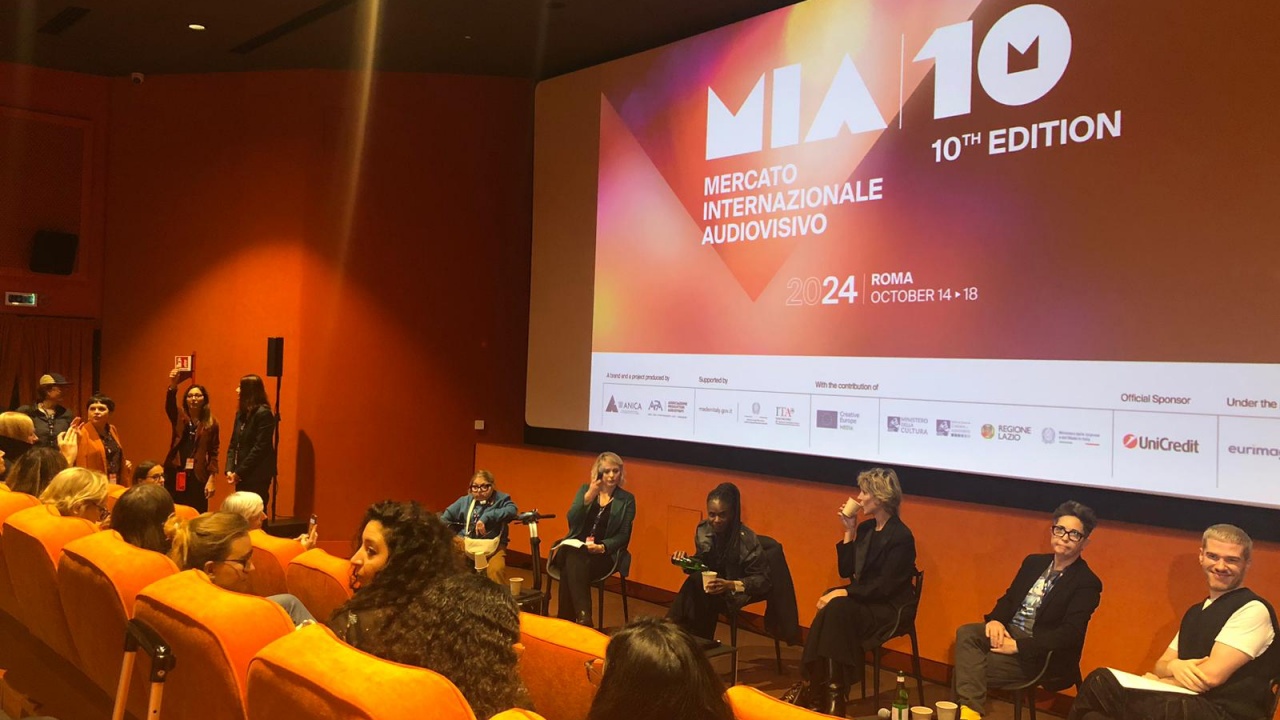The panel Diverse Talents Wanted! Addressing a Need in the Audiovisual Market: Access and opportunities for underrepresented talents was held at the Cinema Barberini during the last day of the tenth edition of the MIA | International Audiovisual Market.
The event, organised in collaboration with Women in Film, Television & Media – WIFTMI, focused on the identification of tools and strategies to broaden access to training and work opportunities for talents belonging to underrepresented groups, thus guaranteeing a supply of qualified resources, enabling a more authentic and plural representation of contemporary society.
The talk was led by Gabriella Crafa, Co-founder and Vice President of Diversity Lab, Marina Cuollo, writer and DEI consultant, Charity Dago, Talent Manager, Founder & CEO of Wariboko, Marzia Macchiarella, DEI Consultant, Access Coordinator and DEI WIFTMI advisor and co-chair, and actress Vittoria Schisano.
The event was moderated by journalist Paolo di Lorenzo, who opened the panel by offering some data on which to start reflecting: “According to official data verified by Diversity, 24% of Italian people suffer from disabilities, not counting neurodivergences (…) The people we are talking about are not few, but they do not manage to get in front of or behind the screen”.
Marzia Macchiarella, taking the floor, further emphasises that the panel was strongly desired within the MIA Market because it is a market theme: “We tell stories and provide entertainment and address a more diverse audience than one might think.
We have to reach out to this audience and the way to do this is by involving people from underrepresented groups throughout the industry”.
Even more incisive on the subject is the intervention of Marina Cuollo, who, dealing with Diversity and Inclusion, D&I processes, highlights the need to create coherence between disability representation in the audiovisual sector and the ability to establish ‘inclusive’ selection channels:
“People are there, the percentages show it, but it happens that we do not see them appear in audiovisual products. Disability is present, however, if we look at the acting sector, in the history of the academy only three people with disabilities have won Oscars and this contrasts with the actual number of people with disabilities’, then adds “The classic recruitment channels are not the best for people with disabilities, there are people who do not even imagine they can do that job or if they do they know that they will be faced with so many obstacles that they will give up”.
Charity Dago, a talent manager who promotes Afro-descendant artists, spoke about her agency’s experience: “If you are represented it means you exist and that is why I created Wariboko. To bring a black body to Italy is very difficult, our mission is to represent people with an immigrant background. (…) People need to scream their presence, to see themselves represented is a dream”.
Actress Vittoria Schisano, star of the six-part Netflix series ‘La vita che volevi’, also insists on the same point: “Representation becomes culture, and does the job of educating people about diversity, which does not happen in schools. Where there is no representation of diversity there is censorship, full stop.
On the role of Gloria, a central character in the series, she adds: ‘It has come a long way but it is still too little. Before my Netflix series ‘The Life You Wanted’ I had only been offered roles that embarrassed me, they were always with the filter of prejudice, I was ashamed to be part of a sick system.
When this series came along I finally told the story I could do. The main character has a story like everyone else and then her personal story that does not affect her narrative path. Usually in the series homosexuals do homosexuals as a job, transsexuals do transsexuals, blacks do blacks and so on”.
The panel was closed by Gabriella Crafa, who emphasised the onus on the media to shape the collective imagination and thus also to develop a better society: “Beyond compliance issues for Italy, an international outlook must be adopted: most people want diversification not only on screen but also behind it.
The writing room of a project must be as diverse as the cast.I want to say that Diversity wants to work out solutions and bring people from the industry who care about the issue to the table. We want to respond to the ‘can’t be found’ when asking to include unrepresented individualities.The Diversifind platform we have created will try to remove this alibi, people who are part of under-represented groups will be able to register on it and in a month’s time they will be able to be contacted by casts or productions, who are looking for them for compliance and also because they need them. From Monday it will be active and in a month’s time it will be open to the industry”.

